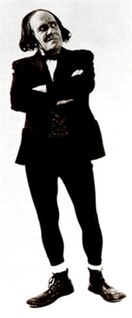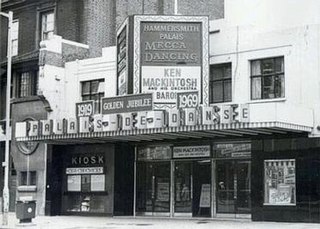Phil Tate (28 April 1922 – 9 December 2005) was an English dance bandleader. [1]
A bandleader is the leader of a music group such as a rock or pop group or jazz quartet. The term is most commonly, though not exclusively, used with a group that plays popular music as a small combo or a big band, such as one which plays jazz, blues, rhythm and blues or rock and roll music. Most bandleaders are also performers with their own band, either as singers or as instrumentalists, playing an instrument such as electric guitar, piano, or other instruments.
Born John Philip Tate in Bramley, Leeds, Yorkshire, England, [1] Tate played violin from the age of eight, and was later an autodidact on clarinet and saxophone. [2] He formed his own group, the Five Quavers, while in high school, and played in the RAF Silver Wings Dance Orchestra during World War II. [1] The ensemble proved so cohesive that all twelve of its members decided to continue playing together after the war, under the name Phil Tate & His Orchestra, taking a residency at Leas Cliff Hall in Folkestone. Their instrumentation was unusual, featuring five saxes and three flutes. After appearing in the 1951 film Green Grow the Rushes , they took their next residency at the Hammersmith Palais and signed to Oriole Records. [2]

Leeds is a city in West Yorkshire, England. Leeds has one of the most diverse economies of all the UK's main employment centres and has seen the fastest rate of private-sector jobs growth of any UK city. It also has the highest ratio of private to public sector jobs of all the UK's Core Cities, with 77% of its workforce working in the private sector. Leeds has the third-largest jobs total by local authority area, with 480,000 in employment and self-employment at the beginning of 2015. Leeds is ranked as a gamma world city by the Globalization and World Cities Research Network. Leeds is the cultural, financial and commercial heart of the West Yorkshire Urban Area. Leeds is served by four universities, and has the fourth largest student population in the country and the country's fourth largest urban economy.

Yorkshire, formally known as the County of York, is a historic county of Northern England and the largest in the United Kingdom. Due to its great size in comparison to other English counties, functions have been undertaken over time by its subdivisions, which have also been subject to periodic reform. Throughout these changes, Yorkshire has continued to be recognised as a geographical territory and cultural region. The name is familiar and well understood across the United Kingdom and is in common use in the media and the military, and also features in the titles of current areas of civil administration such as North Yorkshire, South Yorkshire, West Yorkshire and East Riding of Yorkshire.

The violin, sometimes known as a fiddle, is a wooden string instrument in the violin family. Most violins have a hollow wooden body. It is the smallest and highest-pitched instrument in the family in regular use. Smaller violin-type instruments exist, including the violino piccolo and the kit violin, but these are virtually unused. The violin typically has four strings tuned in perfect fifths with notes G3, D4, A4, E5, and is most commonly played by drawing a bow across its strings, though it can also be played by plucking the strings with the fingers (pizzicato) and by striking the strings with the wooden side of the bow.
Tate's orchestra played at the Hammersmith for a full decade, then moved to the Ilford Palais. Concomitantly, Tate hosted the BBC show Non-Stop-Pop, where he interviewed The Beatles on 30 July 1963. On radio, he was best known for his 144 appearances in Music While You Work . In 1964, his orchestra took up at the Locarno Ballroom in Streatham; the next year they appeared on the BBC program Music Through Midnight. [2] Tate's most longstanding association came in 1965, when he became musical director for the Miss World Pageant. [1] [2] He disbanded his orchestra in 1967, and ran Mecca Agencies in addition to his duties with Miss World, where he remained until his retirement in 1992. [2]
The British Broadcasting Corporation (BBC) is a British public service broadcaster. Its headquarters are at Broadcasting House in Westminster, London, and it is the world's oldest national broadcasting organisation and the largest broadcaster in the world by number of employees. It employs over 20,950 staff in total, 16,672 of whom are in public sector broadcasting. The total number of staff is 35,402 when part-time, flexible, and fixed-contract staff are included.

The Beatles were an English rock band formed in Liverpool in 1960. The line-up of John Lennon, Paul McCartney, George Harrison and Ringo Starr led the band to be regarded as the foremost and most influential in history. With a sound rooted in skiffle, beat and 1950s rock and roll, the group were integral to the evolution of pop music into an art form, and to the development of the counterculture of the 1960s. They often incorporated elements of classical music, older pop forms, and unconventional recording techniques in innovative ways, and in later years experimented with a number of musical styles ranging from pop ballads and Indian music to psychedelia and hard rock. As they continued to draw influences from a variety of cultural sources, their musical and lyrical sophistication grew, and they came to be seen as embodying the era's sociocultural movements.
Music While You Work was a daytime radio programme of continuous live popular music broadcast in the United Kingdom twice daily on workdays from 23 June 1940 until 29 September 1967 by the BBC, initially in the Forces / General Forces Programme, and after the war in the BBC Light Programme and, in the mornings, also on the BBC Home Service. The programme began in World War II. By playing non-stop popular / light music at an even tempo it aimed to help factory workers become more productive. For a period, a third edition was broadcast in the late evening for night-shift workers.
He served as director of the Music Users' Council from 1992 to 2000, after which he retired. [1]







